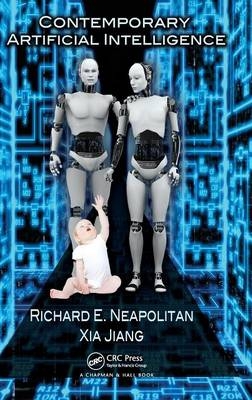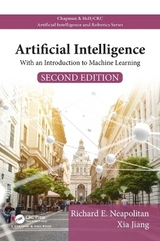
Contemporary Artificial Intelligence
Taylor & Francis Inc (Verlag)
978-1-4398-4469-4 (ISBN)
- Titel erscheint in neuer Auflage
- Artikel merken
One of the first AI texts accessible to students, the book focuses on the most useful problem-solving strategies that have emerged from AI. In a student-friendly way, the authors cover logic-based methods; probability-based methods; emergent intelligence, including evolutionary computation and swarm intelligence; data-derived logical and probabilistic learning models; and natural language understanding. Through reading this book, students discover the importance of AI techniques in computer science.
Richard E. Neapolitan is a professor of computer science at Northeastern Illinois University. Dr. Neapolitan has published in prestigious journals related to reasoning under uncertainty and has authored five books: Probabilistic Reasoning in Expert Systems, Learning Bayesian Networks, Foundations of Algorithms, Probabilistic Methods for Financial and Marketing Informatics, and Probabilistic Methods for Bioinformatics. His research interests include probability and statistics, expert systems, cognitive science, and applications of probabilistic modeling to fields such as medicine, biology, and finance. Xia Jiang is an assistant professor in the Department of Biomedical Informatics at the University of Pittsburgh. Dr. Jiang co-authored Probabilistic Methods for Financial and Marketing Informatics. Her current research focuses on developing novel algorithms/systems that improve the computational efficiency of large data analysis and network modeling of cancer genome data.
Introduction to Artificial Intelligence
History of Artificial Intelligence
Contemporary Artificial Intelligence
LOGICAL INTELLIGENCE
Propositional Logic
Basics of Propositional Logic
Resolution
Artificial Intelligence Applications
Discussion and Further Reading
First-Order Logic
Basics of First-Order Logic
Artificial Intelligence Applications
Discussion and Further Reading
Certain Knowledge Representation
Taxonomic Knowledge
Frames
Nonmonotonic Logic
Discussion and Further Reading
PROBABILISTIC INTELLIGENCE
Probability
Probability Basics
Random Variables
Meaning of Probability
Random Variables in Applications
Probability in the Wumpus World
Uncertain Knowledge Representation
Intuitive Introduction to Bayesian Networks
Properties of Bayesian Networks
Causal Networks as Bayesian Networks
Inference in Bayesian Networks
Networks with Continuous Variables
Obtaining the Probabilities
Large-Scale Application: Promedas
Advanced Properties of Bayesian Network
Entailed Conditional Independencies
Faithfulness
Markov Equivalence
Markov Blankets and Boundaries
Decision Analysis
Decision Trees
Influence Diagrams
Modeling Risk Preferences
Analyzing Risk Directly
Good Decision versus Good Outcome
Sensitivity Analysis
Value of Information
Discussion and Further Reading
EMERGENT INTELLIGENCE
Evolutionary Computation
Genetics Review
Genetic Algorithms
Genetic Programming
Discussion and Further Reading
Swarm Intelligence
Ant System
Flocks
Discussion and Further Reading
LEARNING
Learning Deterministic Models
Supervised Learning
Regression
Learning a Decision Tree
Learning Probabilistic Model Parameters
Learning a Single Parameter
Learning Parameters in a Bayesian Network
Learning Parameters with Missing Data
Learning Probabilistic Model Structure
Structure Learning Problem
Score-Based Structure Learning
Constraint-Based Structure Learning
Application: MENTOR
Software Packages for Learning
Causal Learning
Class Probability Trees
Discussion and Further Reading
More Learning
Unsupervised Learning
Reinforcement Learning
Discussion and Further Reading
LANGUAGE UNDERSTANDING
Natural Language Understanding
Parsing
Semantic Interpretation
Concept/Knowledge Interpretation
Information Extraction
Discussion and Further Reading
Bibliography
Index
| Reihe/Serie | Chapman & Hall/CRC Artificial Intelligence and Robotics Series |
|---|---|
| Zusatzinfo | N/A; CR Book; 101 Tables, black and white; 198 Illustrations, black and white |
| Verlagsort | Washington |
| Sprache | englisch |
| Maße | 156 x 234 mm |
| Gewicht | 839 g |
| Themenwelt | Informatik ► Theorie / Studium ► Künstliche Intelligenz / Robotik |
| Technik ► Elektrotechnik / Energietechnik | |
| ISBN-10 | 1-4398-4469-0 / 1439844690 |
| ISBN-13 | 978-1-4398-4469-4 / 9781439844694 |
| Zustand | Neuware |
| Haben Sie eine Frage zum Produkt? |
aus dem Bereich



